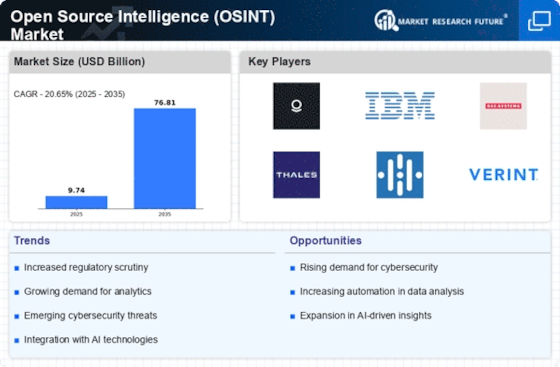Top Industry Leaders in the Open Source Intelligence Market

Competitive Landscape of Open Source Intelligence Market
The Open Source Intelligence (OSINT) sector is undergoing substantial expansion, propelled by factors such as escalating cyber threats, a growing demand for competitive intelligence, and heightened recognition of the potential within publicly available data. This dynamic environment showcases a diverse array of participants, each employing distinctive offerings and strategic approaches.
Key Players:
- ShadowDragon
- Social Link
- Google LLC
- Digital Intelligence
- Palantir Technologies
- Alfresco Software, Inc.
- Siemens AG
- Maltego Technologies
- Expert System S.p.A.
- IPS S.p.A.
- Digital Clues
- NetSentries Technologies FZCO
- Recorded Future, Inc.
- Thales Group
Strategies Adopted:
Prominent players in the OSINT market are implementing diverse strategies to sustain their competitive advantage, encompassing:
- Innovation: Consistently developing novel features, functionalities, and advanced analytics techniques to address evolving market requirements.
- Partnerships: Collaborating with fellow vendors and technology providers to deliver comprehensive solutions and broaden market outreach.
- Acquisitions: Pursuing strategic acquisitions to diversify product portfolios and gain access to new technologies and talent.
- Geographic Expansion: Prioritizing entry into new markets and extending their global footprint.
- Verticalization: Customizing solutions to cater to specific industry needs and verticals, such as finance, healthcare, and government.
Factors for Market Share Analysis:
Several critical factors impact market share analysis in the OSINT market, including:
- Product Portfolio: Extent and depth of solutions provided, encompassing various data sources and functionalities.
- Technology: Advanced analytics capabilities, data processing power, and employment of machine learning algorithms.
- Market Presence: Global reach, established customer base, and brand recognition.
- Industry Focus: Specialization in specific verticals or domains with tailored solutions.
- Customer Service: Quality of support, training, and integration services provided.
New and Emerging Companies:
The OSINT market consistently welcomes new participants, introducing novel perspectives and inventive solutions. Some noteworthy emerging companies include:
- Maltego: Offers a distinctive graph-based approach to OSINT, facilitating investigative workflows and entity relationship analysis.
- SpiderFoot: Provides an open-source OSINT platform, empowering individuals and organizations with free access to robust intelligence gathering tools.
- Graphistry: Develops a knowledge graph platform designed for visualizing and analyzing large-scale datasets, including OSINT sources.
- Snyk: Specializes in open-source security and offers solutions for identifying and remedying vulnerabilities in open-source code.
- The Walrus: Provides a social media monitoring and analysis platform with a focus on identifying online threats and emerging trends.
May 2023
The commercial DreamStudio interface for Stability AI's AI picture generating model, Stable Diffusion, will be made open-source in 2023. Stability AI stated in a news release on Wednesday that the new version, StableStudio, "marks a fresh chapter" for the platform and will be a demonstration of the business's "dedication to advancing open-source development."
The worldwide EY organisation (EY) announced today that EY.ai, a platform that unifies human talents and artificial intelligence (AI), will launch in 2023. EY.ai will assist customers in transforming their businesses through the confident and responsible deployment of AI. With significant expertise in strategy, transactions, transformation, risk, assurance, and tax, together with a strong AI ecosystem, EY.ai makes use of cutting-edge EY technology platforms and AI capabilities.
In 2023, Llama-v2, an open-source large language model (LLM) that employs artificial intelligence (AI) to produce text, graphics, and code, was made available in a commercial form by Meta, better known to most of us as Facebook. The Large Language Model Meta AI (Llama) first release was only available to authorised researchers and organisations, according to a public announcement made in February. Early in March, though, it was posted online for anybody to download and use.










